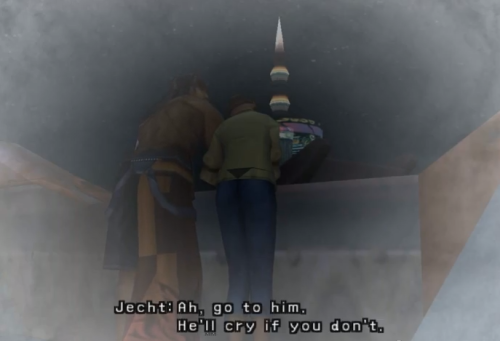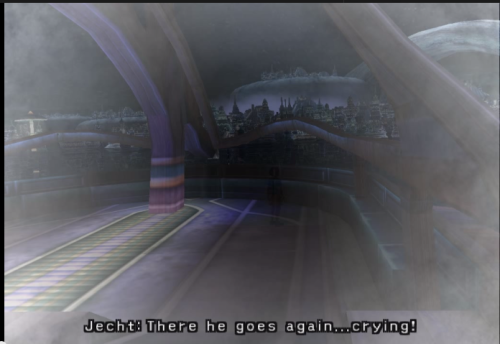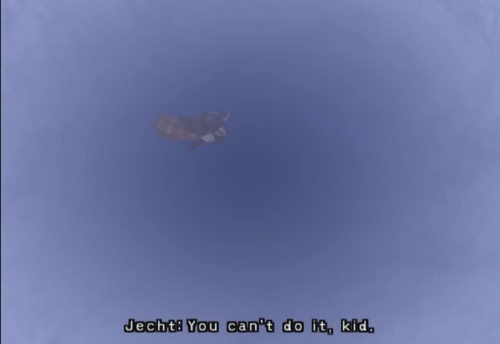auronlu:Unpopular Opinion: Jecht the Child AbuserI know it’s partly due to Dissidia, which re-imagin
auronlu:Unpopular Opinion: Jecht the Child AbuserI know it’s partly due to Dissidia, which re-imagines FF characters in more appealing or fun ways, often reducing them to what looks like a fandom caricature that’s easy to understand even if you don’t know their backstory and context. I know that Jecht gets a major rehabilitation and makeover in Dissidia that turns him into a much more sympathetic character.But I’m seeing so much glorification of Jecht in fandom these days that I wanna say: whoa, hang on. Let’s not forget who this guy was in FFX.Lately I’ve been seeing a lot of fanart portraying Jecht with young Tidus, cuddling, hugging, having fun with him. The two of them laughing. I see a lot of charming and endearing images of father-son affection. They seduce me too: it’s a very appealing genre of fanart. But these images are the exact opposite of what the game actually shows us about this father-son relationship when Tidus was a child.Video games have limited screentime to devote to flashbacks, and every last one of the Tidus-Jecht flashbacks builds up a consistent picture of psychological abuse:Jecht neglecting Tidus, leaving child care only to his mother.Jecht’s only interactions with young Tidus seem to be sneering at him, mocking him, telling the child (and telling everybody else, even Auron and Braska, apparently) over and over that he’s a crybaby, reducing him to tears in nearly every conversation. Talk about negative feedback loop.Jecht is a drunk and chronic alcoholic, to the point that it’s affecting his career, not to mention his home life (he finally overcomes his drinking problem in Spira, when it’s become a costly liability to Braska and Auron — but he couldn’t do it for his own son.)Jecht does not play with his son. When he discovers his son with a ball, Jecht’s reaction is not to play ball with his son, which would be a normal response for just about any father. Instead, he sneers that he “usually charges for lessons,” takes the ball away, and shows off to his son with his back turned.When Tidus sneaks off to try and learn blitzball, Jecht verbally abuses and humiliates him (“you can’t do it, kid”), yet more negative reinforcement to ensure the boy never has any self-esteem at all.When Tidus plucks up the nerve to challenge his father about his drinking problem, the response is a belligerent “what did you say?” and a verbal smackdown that reduces Tidus to tears, as usual.All of this occurs when Tidus is seven or younger, because that’s when Jecht disappears. A lot of what we’re seeing is verbal and psychological abuse heaped on a five-year-old.Yes, Jecht tries to make up for his lousy behavior later, not that he ever apologizes. Yes, Jecht really did love his son, although, as Auron notes, he could never say it. Yes, Jecht was willing to sacrifice himself for Braska, just as many abusers will be more generous with friends or in the public sphere than they are with their own children. Yes, Jecht shows a lot of character growth on his pilgrimage with Braska.But that doesn’t negate the fact that as a father, he was an alcoholic who neglected or verbally abused his young son.When my dashboard is full of too many fanarts and gifs glorifying Jecht, when I see repeated fansquee about Jecht the cool badass, when I see those cute “Jecht with young Tidus” fanarts, it starts bothering me. Sometimes these portrayals of Jecht acknowledge his flaws, presenting him as a complex character composed of admirable and execrable qualities. But often they remind me of real life, where abusers are celebrated as sports stars, heroes, and “swell guys,” giving them a free pass as abusers and erasing their victims, brushing off abuse victims’ experiences as unimportant, exaggerated, all in their own minds, or “not that bad.”I’m not saying, “you can’t be a fan of Jecht.” He’s a fascinating character, and I see the good as well as the bad. I like the character arc of both Jecht and Tidus in FFX, which culminates in a truly moving scene in which neither one says what they really mean, yet both of them understand (and respect, and love) one another. Real world dysfunctional relationships are messy, not always reducible to pure good and evil. I’m just saying, “Let’s not forget that Jecht was an abusive dad to a young boy. Let’s not erase Tidus’ experiences as a victim of child abuse.” -- source link
Tumblr Blog : auronlu.tumblr.com







